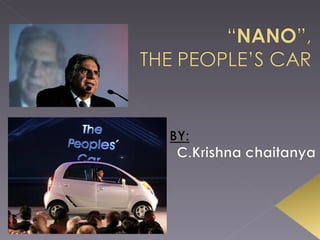Nano
- 1. ╠²
- 2. WorldŌĆÖs cheapest car. Stylish, comfortable Fuel-efficient engine Meets all safety requirements Environment-friendly
- 3. Length 3.1 meters Width 1.5 meters Height 1.6 meters Engine All-aluminium, Rear Mounted, Rear Wheel Drive Capacity 623 cc Power 33 PS Fuel Injection Multi Point Fuel Injection (MPFI) Fuel Type Petrol, Diesel Version will be later Body Type Sheet Metal Seating Capacity 04 (Four) Mileage 20-22 Kmpl (City drive) 26 Kmpl (Highways) Top Speed 75 K.M Emission Norms Euro-IV, Bharat Stage-III compliant Safety Norms Frontal Crash Tested Versions One Standard and Two Deluxe
- 4. ╠²
- 5. ╠²
- 6. ╠²
- 7. The Tata Nano uses plastics and adhesives rather than welding. introducing the car with an artificially low price through govt-subsidies and tax-breaks, or using vertical-integration, or partially using inexpensive polymers or biodegradable plastics instead of a full metal-body. It has no AC, no power steering, no power windows, no power bells and whistles.
- 8. ╠²
- 9. The low-cost car is clearly intended for the masses . For the family of four that would otherwise ride on a scooter, precariously balancing a tiny tot on the front and a baby on the wifeŌĆÖs lap. For the first-time car buyer in India - a huge market despite the increasing number of cars in the urban and semi-urban areas. Its Also attract the small cars buyers like maruti 800.
- 10. ╠²
- 11. Tata Motors Limited , formerly known as TELCO (TATA Engineering and Locomotive Company), is a multinational corporation headquartered in Mumbai, India. Tata Motors has its manufacturing base in Jamshedpur, Pantnagar, Lucknow, Pune. Tata Motors was established in 1945, when the company began manufacturing locomotives. In March 2008, it finalized a deal with Ford Motor Company to acquire their British Jaguar Land Rover (JLR) business, which also includes the Rover, Daimler and Lanchester brand names.
- 12. Controversies arose for ŌĆ£NANOŌĆØ manufacturing unit in ŌĆśSingurŌĆÖ, West Bengal. Due to ongoing opposition to Tata's Singur car-factory by MamtaBanerjee, who demanded land to be returned from the factory, TataMotors took decision to pull out of Singur. Tata Motors is manufacturing Tata Nano at its Pantnagar plant . The exit lead West Bengal a loss of more than 80,000 crores.
- 13. ╠²
- 14. THE NEARER COMPETETORS FOR ŌĆ£NANOŌĆØ
- 15. Will the Nano succeed? Car of the Future? Is it fair to blame the Nano for the (upcoming) ills of Indian road infrastructure? What do you think? Is the Nano a car of the future? Or just another Yugo debacle waiting to happen? Would you drive one?
- 16. ╠²
















